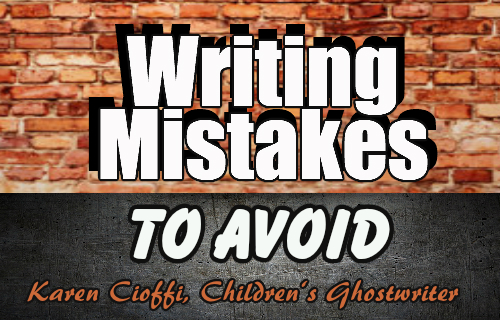Contributed by Suzanne Lieurance
A few mistakes in your fiction can often make the difference between a very good manuscript and a not-so-good one that is rejected by publishers.
Below are just three of the most common mistakes in fiction that I see day after day as a writing instructor and writing coach:
1) Overuse of participle phrases to begin a sentence.
A participle phrase usually begins with a word that ends in the letters “ing.”
There is nothing wrong with beginning a sentence with a participle phrase.
But when you do it too often, it begins to draw attention to itself and distract the reader from the action of the story.
Like this:
Reaching behind her, Mary grabbed her backpack and ran straight for the woods. Pushing branches and tangled vines out of her way, she was able to find the foot path. But a snake was stretched out across it. Turning around quickly and searching for another way through the forest, she suddenly heard someone call out her name.
Notice how clunky that sounds.
When you finish writing a story, go back over it and circle all the sentences that begin with a participle phrase.
If you have several of these phrases on each and every page, change most of them.
Like this:
Mary reached behind her and grabbed her backpack, then she ran straight for the woods. She pushed branches and tangled vines out of her way until she was able to find the foot path. But a snake was stretched out across it, so she turned quickly and searched for another way through the forest. Suddenly, she heard someone call out her name.
2) Dislocating or projecting body parts.
Yes, many writers actually do this in their stories.
The most common example of this is when characters’ eyes leave their bodies.
Here’s what I mean:
I was angry at my brother. I shot my eyes across the room at him and gave him a dirty look.
Yikes!
Was the poor brother left holding those eyeballs, or were they just stuck on the front of his shirt or something?
3) Dialogue that is punctuated incorrectly.
The most common example is when characters laugh words.
They simply can’t do this.
Try it yourself.
Can you laugh and speak at the same time?
Not really.
Yet, when you use a comma to separate the dialogue tag from the dialogue itself, you are indicating the words were laughed.
Here’s an example:
“I’d never try that in a million years,” laughed Denise.
To avoid this mistake, simply use a period after the dialogue, creating two separate sentences.
Like this:
“I’d never try that in a million years.” Denise laughed.
Each of these mistakes is easy to correct.
But now that you’re aware of them they should be easy to avoid in the first place!
Try it!

Suzanne Lieurance is a freelance writer, author, and writing coach.
For more writing tips and resources for writers, visit writebythesea.com, and don’t forget to get your free subscription to The Morning Nudge.
This article was first published at: https://www.writersonthemove.com/2020/02/3-mistakes-to-avoid-when-writing-fiction.html
I’m a working children’s ghostwriter, rewriter, and coach. I can help turn your story into a book you’ll be proud to be the author of, one that’s publishable and marketable.
OTHER HELP I OFFER:
HOW TO WRITE A CHILDREN'S FICTION BOOK
A 200+ book that will help you write your own children’s book.
FICTION WRITING FOR CHILDREN eCOURSE
4, 8, or 12 Weeks / 8 Sections / Instructor Guided Self-Study Program
WRITERS ON THE MOVE SELF-PUBLISHING SERVICE
Self-publishing help for children’s authors
(Picture books and chapter books)
You can contact me at kcioffiventrice@gmail.com.
MORE ON WRITING FOR CHILDREN
Children’s Writing – Creating your Main Character P1
Secondary Characters – Are They Important?
Be a Successful Writer Even if You Don’t Think You Have Enough Time



1 thought on “3 Fiction Writing Mistakes to Avoid”